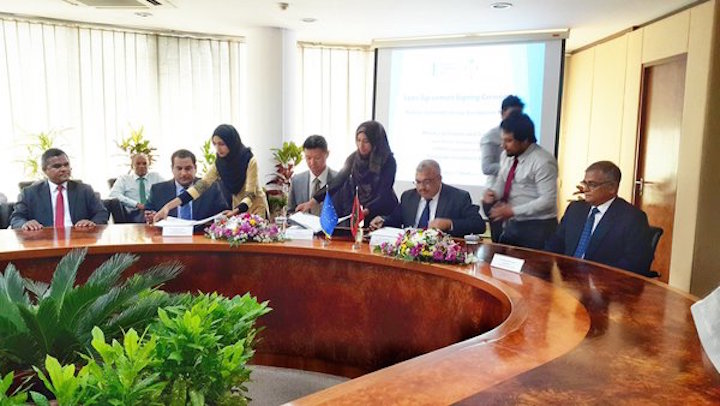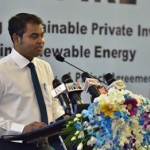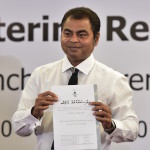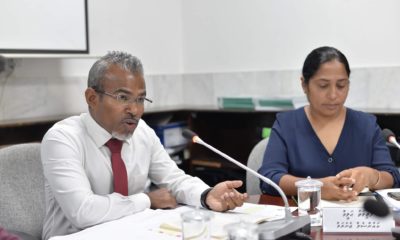The government has obtained a €45 million loan from the European Investment Bank to finance renewable energy projects and upgrade electricity networks in the atolls.
The loan agreement was signed on Tuesday morning at the State Electricity Company office in Malé. Finance Minister Abdulla Jihad signed on behalf of the government while loan officer Tao Ren signed on behalf of the EIB.
The state-owned utility companies STELCO and Fenaka Corporation also signed the loan agreement. The MVR771 million loan is to be repaid in 18 years at an interest rate of 3.3 percent with a three-year grace period.
State Minister for Energy Abdul Matheen told the press at the signing ceremony that the government aims to invest US$129 million to achieve its target of generating 30 percent of daily peak electricity from renewable sources by 2019.
The government has also secured a US$30 million loan from the Climate Investment Fund, he added, whilst the Islamic Development Bank and the Japanese government have pledged to provide loans of US$10 million and US$5.5 million, respectively.
Matheen said the EIB funds will also be used to build a grid connecting the capital and its suburb by laying electricity cables on the Malé-Hulhulé bridge currently under construction. The government is seeking a consultant for the project, he said.
Meanwhile, in November, the UN’s Green Climate Fund approved US$23.6 million for a project to ensure the delivery of safe freshwater to 105,000 people in the outer islands of the Maldives.
The project is among the first eight investments approved by the GCF, a global initiative established to provide financing from wealthy nations for adaptation projects in developing countries. The GCF released US$183 million in funding ahead of the climate change talks in Paris last December.
While the Maldives lobbied to reduce global carbon emissions and keep global temperature rises to 1.5 degree celsius at COP21, the current administration is pursuing seemingly contradictory policies of investing in renewable energy and exploring for oil.
Exploring for oil is among President Abdulla Yameen’s key campaign pledges. In February last year, some 20 NGOs urged the government to reconsider the policy, saying the venture will risk the country’s economic and environmental health.
Local environmental groups opposed to the move say exploring for fossil fuels is hypocritical, as the Maldives is among the world’s most vulnerable countries to climate change impacts such as sea level rise, ocean acidification and extreme weather events.
Meanwhile, in a new action plan submitted ahead of crucial climate change negotiations in December, the government pledged to reduce greenhouse gas emissions by 10 percent before 2030 by switching to renewable sources of energy.
The 10 percent target fell far short of ambitious plans announced by former President Mohamed Nasheed in early 2009 for the Maldives to become carbon neutral by 2020, which has since been scrapped by successive administrations.
The Maldives’ energy demand is almost completely met by fossil fuels with up to 30 percent of the country’s GDP spent on importing petroleum products.





















